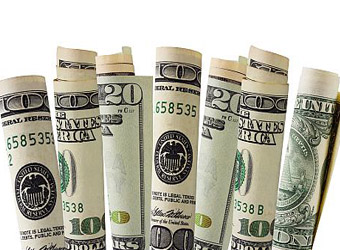U.S. dollar prices limped off multi-month lows against major peers on Tuesday, with much of the lift from Trump’s trade now gone.
The greenback had taken a beating as market participants saw the prospects for a U.S. financial spending boost from President Donald Trump significantly diminished by his failure to pass a key healthcare reform bill.
“Clearly, the dollar is reacting to concerns that President Trump might not be able to push through his legislative agenda, given the fact that they’ve ditched, at least for now, healthcare reform,” said Mitul Kotecha, head of FX and rates strategy for Barclays in Singapore.
“There are doubts about whether he can pass his stimulus, and therefore about the bullishness on U.S. growth that we were seeing just a few weeks ago,” he said. “It’s not surprising that the dollar is reacting in this way.”
The dollar index against a basket of major currencies edged up 0.1 percent to 99.212, after plumbing a trough of 98.858 overnight, its lowest level since November 11.
The index had risen to a 14-year high near 104.00 in early January when expectations for inflation-boosting U.S. stimulus under the Trump presidency were at their peak.
The dollar slipped 0.1 percent to 110.605 yen following its slide to 110.110 overnight, its lowest since November 18.
The dollar remains biased towards the downside on receding hopes that the Trump administration will be able to deliver on tax reform and infrastructure spending, said Masafumi Yamamoto, chief forex strategist at Mizuho Securities in Tokyo.
“But a one-way drop by the dollar is also unlikely as the Republicans cannot face midterm elections in November of next year without enacting a single fiscal stimulus step,” he said.
The euro was a shade higher at $1.0865, after scaling$1.0906 in the previous session, its loftiest peak since November 11.
The common currency got a lift from news that German Chancellor Angela Merkel’s conservatives won a regional election in the western state of Saarland on Sunday, dealing a setback to their Social Democrat rivals and boosting Merkel’s prospects of winning a fourth term in September’s national election.
The pound added 0.1 percent to $1.2568 after surging almost one percent to $1.2615 overnight, its highest since February 2.
On Wednesday, British Prime Minister Theresa May will formally notify the European Union of Britain’s intention to leave it, triggering Article 50 of the Lisbon Treaty and launching two years of unprecedented negotiations.
Some major banks have predicted the pound will fall below $1.20 in the negotiation period. Britain appears to have set its course for a hard Brexit, where a clean break is favoured to regain control over issues such as immigration.
The Australian was slightly higher on the day at $0.7620 while the New Zealand dollar was slightly lower at $0.7042.
Source: Reuters










